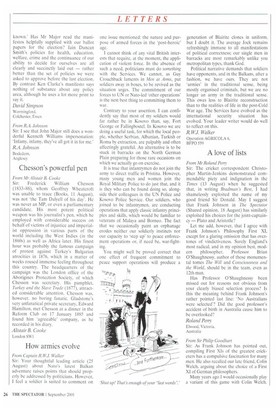How armies evolve
Front Captain R.W.J. Walker Sir: Your thoughtful leading article (25 August) about Nato's latest Balkan adventure raises points that should properly be addressed by politicians. However. I feel a soldier is suited to comment on one issue mentioned: the nature and purpose of armed forces in the 'post-heroic' age.
I cannot think of any vital British interests that require, at the moment, the application of violent force. In the absence of such a need, politicians must do something with the Services. We cannot, as Guy Crouchback laments in Men at Arms, put soldiers away in boxes, to be revived as the situation urges. The commitment of our forces to UN or Nato-led 'other operations' is the next best thing to committing them to war.
Contrary to your assertion, I can confidently say that most of my soldiers would far rather be in Kosovo than, say, Fort George or Fallingbostel. In Kosovo we are doing a useful task, for which the local people, whether Serbian, Albanian, Turkish or Roma by extraction, are palpably and often affectingly grateful. An alternative is to be stuck in barracks on the North German Plain preparing for those rare occasions on which we actually go on exercise.
It is true that infantrymen do not join the army to direct traffic in Pristina. However, many young men and women join the Royal Military Police to do just that, and it is they who can be found doing so, alongside their colleagues in the UN Police and Kosovo Police Service. Our soldiers, who joined to be infantrymen, are conducting operations that apply classic infantry principles and skills, which would be familiar to veterans of Malaya and Borneo. The fact that we occasionally paint an orphanage erodes neither our soldierly instincts nor our capacity to 'step up' to peace enforcement operations or, if need be, war-fighting.
You might well be proved correct that one effect of frequent commitment to peace support operations will produce a
generation of Blairite clones in uniform, but I doubt it. The average Jock remains refreshingly immune to all manifestations of political correctness; our single men in barracks are most remarkably unlike you metropolitan types, thank God.
Political narrative demands that soldiers have opponents, and in the Balkans, after a fashion, we have ours. They are not 'armies' in the traditional sense, being mostly organised criminals, but we are no longer an army in the traditional sense. This owes less to Blairite reconstruction than to the realities of life in the post-Cold War age. The Services have evolved as the international security situation has evolved. Your leader writer would do well to reflect on this.
R.W.J. Walker Operation AGRICOLA 6, BFPO 559


























































 Previous page
Previous page